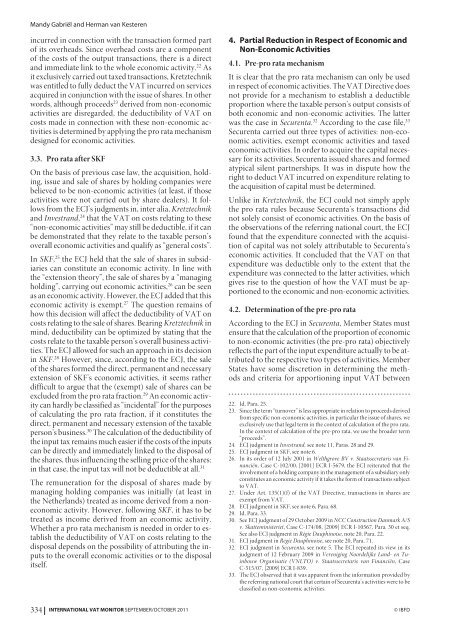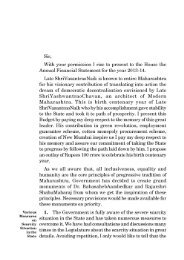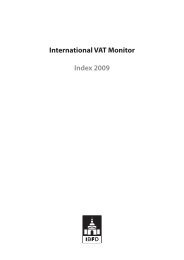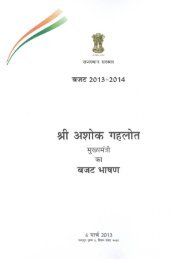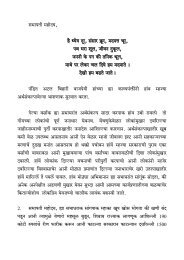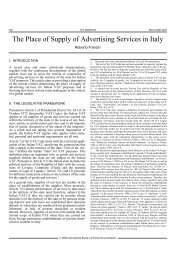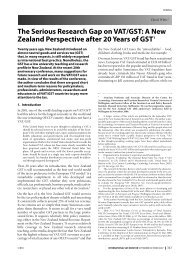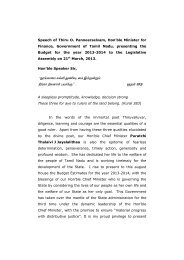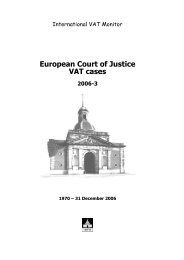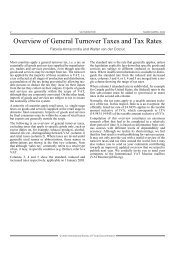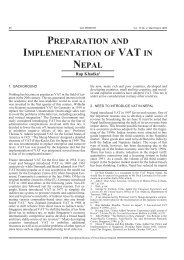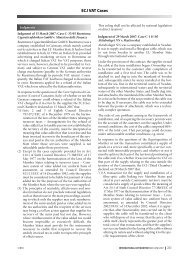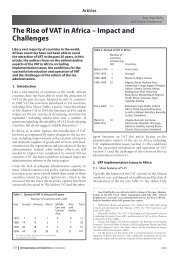Calculation of the (Pre-) Pro Rata under EU VAT Law - empcom.gov.in
Calculation of the (Pre-) Pro Rata under EU VAT Law - empcom.gov.in
Calculation of the (Pre-) Pro Rata under EU VAT Law - empcom.gov.in
You also want an ePaper? Increase the reach of your titles
YUMPU automatically turns print PDFs into web optimized ePapers that Google loves.
Mandy Gabriël and Herman van Kesteren<br />
<strong>in</strong>curred <strong>in</strong> connection with <strong>the</strong> transaction formed part<br />
<strong>of</strong> its overheads. S<strong>in</strong>ce overhead costs are a component<br />
<strong>of</strong> <strong>the</strong> costs <strong>of</strong> <strong>the</strong> output transactions, <strong>the</strong>re is a direct<br />
and immediate l<strong>in</strong>k to <strong>the</strong> whole economic activity. 22 As<br />
it exclusively carried out taxed transactions, Kretztechnik<br />
was entitled to fully deduct <strong>the</strong> <strong>VAT</strong> <strong>in</strong>curred on services<br />
acquired <strong>in</strong> conjunction with <strong>the</strong> issue <strong>of</strong> shares. In o<strong>the</strong>r<br />
words, although proceeds 23 derived from non-economic<br />
activities are disregarded, <strong>the</strong> deductibility <strong>of</strong> <strong>VAT</strong> on<br />
costs made <strong>in</strong> connection with <strong>the</strong>se non-economic activities<br />
is determ<strong>in</strong>ed by apply<strong>in</strong>g <strong>the</strong> pro rata mechanism<br />
designed for economic activities.<br />
3.3. <strong>Pro</strong> rata after SKF<br />
On <strong>the</strong> basis <strong>of</strong> previous case law, <strong>the</strong> acquisition, hold<strong>in</strong>g,<br />
issue and sale <strong>of</strong> shares by hold<strong>in</strong>g companies were<br />
believed to be non-economic activities (at least, if those<br />
activities were not carried out by share dealers). It follows<br />
from <strong>the</strong> ECJ’s judgments <strong>in</strong>, <strong>in</strong>ter alia, Kretztechnik<br />
and Investrand, 24 that <strong>the</strong> <strong>VAT</strong> on costs relat<strong>in</strong>g to <strong>the</strong>se<br />
“non-economic activities” may still be deductible, if it can<br />
be demonstrated that <strong>the</strong>y relate to <strong>the</strong> taxable person’s<br />
overall economic activities and qualify as “general costs”.<br />
In SKF, 25 <strong>the</strong> ECJ held that <strong>the</strong> sale <strong>of</strong> shares <strong>in</strong> subsidiaries<br />
can constitute an economic activity. In l<strong>in</strong>e with<br />
<strong>the</strong> “extension <strong>the</strong>ory”, <strong>the</strong> sale <strong>of</strong> shares by a “manag<strong>in</strong>g<br />
hold<strong>in</strong>g”, carry<strong>in</strong>g out economic activities, 26 can be seen<br />
as an economic activity. However, <strong>the</strong> ECJ added that this<br />
economic activity is exempt. 27 The question rema<strong>in</strong>s <strong>of</strong><br />
how this decision will affect <strong>the</strong> deductibility <strong>of</strong> <strong>VAT</strong> on<br />
costs relat<strong>in</strong>g to <strong>the</strong> sale <strong>of</strong> shares. Bear<strong>in</strong>g Kretztechnik <strong>in</strong><br />
m<strong>in</strong>d, deductibility can be optimized by stat<strong>in</strong>g that <strong>the</strong><br />
costs relate to <strong>the</strong> taxable person’s overall bus<strong>in</strong>ess activities.<br />
The ECJ allowed for such an approach <strong>in</strong> its decision<br />
<strong>in</strong> SKF. 28 However, s<strong>in</strong>ce, accord<strong>in</strong>g to <strong>the</strong> ECJ, <strong>the</strong> sale<br />
<strong>of</strong> <strong>the</strong> shares formed <strong>the</strong> direct, permanent and necessary<br />
extension <strong>of</strong> SKF’s economic activities, it seems ra<strong>the</strong>r<br />
difficult to argue that <strong>the</strong> (exempt) sale <strong>of</strong> shares can be<br />
excluded from <strong>the</strong> pro rata fraction. 29 An economic activity<br />
can hardly be classified as “<strong>in</strong>cidental” for <strong>the</strong> purposes<br />
<strong>of</strong> calculat<strong>in</strong>g <strong>the</strong> pro rata fraction, if it constitutes <strong>the</strong><br />
direct, permanent and necessary extension <strong>of</strong> <strong>the</strong> taxable<br />
person’s bus<strong>in</strong>ess. 30 The calculation <strong>of</strong> <strong>the</strong> deductibility <strong>of</strong><br />
<strong>the</strong> <strong>in</strong>put tax rema<strong>in</strong>s much easier if <strong>the</strong> costs <strong>of</strong> <strong>the</strong> <strong>in</strong>puts<br />
can be directly and immediately l<strong>in</strong>ked to <strong>the</strong> disposal <strong>of</strong><br />
<strong>the</strong> shares, thus <strong>in</strong>fluenc<strong>in</strong>g <strong>the</strong> sell<strong>in</strong>g price <strong>of</strong> <strong>the</strong> shares:<br />
<strong>in</strong> that case, <strong>the</strong> <strong>in</strong>put tax will not be deductible at all. 31<br />
The remuneration for <strong>the</strong> disposal <strong>of</strong> shares made by<br />
manag<strong>in</strong>g hold<strong>in</strong>g companies was <strong>in</strong>itially (at least <strong>in</strong><br />
<strong>the</strong> Ne<strong>the</strong>rlands) treated as <strong>in</strong>come derived from a noneconomic<br />
activity. However, follow<strong>in</strong>g SKF, it has to be<br />
treated as <strong>in</strong>come derived from an economic activity.<br />
Whe<strong>the</strong>r a pro rata mechanism is needed <strong>in</strong> order to establish<br />
<strong>the</strong> deductibility <strong>of</strong> <strong>VAT</strong> on costs relat<strong>in</strong>g to <strong>the</strong><br />
disposal depends on <strong>the</strong> possibility <strong>of</strong> attribut<strong>in</strong>g <strong>the</strong> <strong>in</strong>puts<br />
to <strong>the</strong> overall economic activities or to <strong>the</strong> disposal<br />
itself.<br />
334<br />
4. Partial Reduction <strong>in</strong> Respect <strong>of</strong> Economic and<br />
Non-Economic Activities<br />
4.1. <strong>Pre</strong>-pro rata mechanism<br />
It is clear that <strong>the</strong> pro rata mechanism can only be used<br />
<strong>in</strong> respect <strong>of</strong> economic activities. The <strong>VAT</strong> Directive does<br />
not provide for a mechanism to establish a deductible<br />
proportion where <strong>the</strong> taxable person’s output consists <strong>of</strong><br />
both economic and non-economic activities. The latter<br />
was <strong>the</strong> case <strong>in</strong> Securenta. 32 Accord<strong>in</strong>g to <strong>the</strong> case file, 33<br />
Securenta carried out three types <strong>of</strong> activities: non-economic<br />
activities, exempt economic activities and taxed<br />
economic activities. In order to acquire <strong>the</strong> capital necessary<br />
for its activities, Securenta issued shares and formed<br />
atypical silent partnerships. It was <strong>in</strong> dispute how <strong>the</strong><br />
right to deduct <strong>VAT</strong> <strong>in</strong>curred on expenditure relat<strong>in</strong>g to<br />
<strong>the</strong> acquisition <strong>of</strong> capital must be determ<strong>in</strong>ed.<br />
Unlike <strong>in</strong> Kretztechnik, <strong>the</strong> ECJ could not simply apply<br />
<strong>the</strong> pro rata rules because Securenta’s transactions did<br />
not solely consist <strong>of</strong> economic activities. On <strong>the</strong> basis <strong>of</strong><br />
<strong>the</strong> observations <strong>of</strong> <strong>the</strong> referr<strong>in</strong>g national court, <strong>the</strong> ECJ<br />
found that <strong>the</strong> expenditure connected with <strong>the</strong> acquisition<br />
<strong>of</strong> capital was not solely attributable to Securenta’s<br />
economic activities. It concluded that <strong>the</strong> <strong>VAT</strong> on that<br />
expenditure was deductible only to <strong>the</strong> extent that <strong>the</strong><br />
expenditure was connected to <strong>the</strong> latter activities, which<br />
gives rise to <strong>the</strong> question <strong>of</strong> how <strong>the</strong> <strong>VAT</strong> must be apportioned<br />
to <strong>the</strong> economic and non-economic activities.<br />
4.2. Determ<strong>in</strong>ation <strong>of</strong> <strong>the</strong> pre-pro rata<br />
Accord<strong>in</strong>g to <strong>the</strong> ECJ <strong>in</strong> Securenta, Member States must<br />
ensure that <strong>the</strong> calculation <strong>of</strong> <strong>the</strong> proportion <strong>of</strong> economic<br />
to non-economic activities (<strong>the</strong> pre-pro rata) objectively<br />
reflects <strong>the</strong> part <strong>of</strong> <strong>the</strong> <strong>in</strong>put expenditure actually to be attributed<br />
to <strong>the</strong> respective two types <strong>of</strong> activities. Member<br />
States have some discretion <strong>in</strong> determ<strong>in</strong><strong>in</strong>g <strong>the</strong> methods<br />
and criteria for apportion<strong>in</strong>g <strong>in</strong>put <strong>VAT</strong> between<br />
22. Id, Para. 25.<br />
23. S<strong>in</strong>ce <strong>the</strong> term “turnover” is less appropriate <strong>in</strong> relation to proceeds derived<br />
from specific non-economic activities, <strong>in</strong> particular <strong>the</strong> issue <strong>of</strong> shares, we<br />
exclusively use that legal term <strong>in</strong> <strong>the</strong> context <strong>of</strong> calculation <strong>of</strong> <strong>the</strong> pro rata.<br />
In <strong>the</strong> context <strong>of</strong> calculation <strong>of</strong> <strong>the</strong> pre-pro rata, we use <strong>the</strong> broader term<br />
“proceeds”.<br />
24. ECJ judgment <strong>in</strong> Investrand, see note 11, Paras. 28 and 29.<br />
25. ECJ judgment <strong>in</strong> SKF, see note 6.<br />
26. In its order <strong>of</strong> 12 July 2001 <strong>in</strong> Welthgrove BV v. Staatssecretaris van F<strong>in</strong>anciën,<br />
Case C-102/00, [2001] ECR I-5679, <strong>the</strong> ECJ reiterated that <strong>the</strong><br />
<strong>in</strong>volvement <strong>of</strong> a hold<strong>in</strong>g company <strong>in</strong> <strong>the</strong> management <strong>of</strong> a subsidiary only<br />
constitutes an economic activity if it takes <strong>the</strong> form <strong>of</strong> transactions subject<br />
to <strong>VAT</strong>.<br />
27. Under Art. 135(1)(f) <strong>of</strong> <strong>the</strong> <strong>VAT</strong> Directive, transactions <strong>in</strong> shares are<br />
exempt from <strong>VAT</strong>.<br />
28. ECJ judgment <strong>in</strong> SKF, see note 6, Para. 68.<br />
29. Id, Para. 33.<br />
30. See ECJ judgment <strong>of</strong> 29 October 2009 <strong>in</strong> NCC Construction Danmark A/S<br />
v. Skattem<strong>in</strong>isteriet, Case C-174/08, [2009] ECR I-10567, Para. 30 et seq.<br />
See also ECJ judgment <strong>in</strong> Régie Dauph<strong>in</strong>oise, note 20, Para. 22.<br />
31. ECJ judgment <strong>in</strong> Régie Dauph<strong>in</strong>oise, see note 20, Para. 71.<br />
32. ECJ judgment <strong>in</strong> Securenta, see note 5. The ECJ repeated its view <strong>in</strong> its<br />
judgment <strong>of</strong> 12 February 2009 <strong>in</strong> Verenig<strong>in</strong>g Noordelijke Land- en Tu<strong>in</strong>bouw<br />
Organisatie (VNLTO) v. Staatssecretaris van F<strong>in</strong>anciën, Case<br />
C-515/07, [2009] ECR I-839.<br />
33. The ECJ observed that it was apparent from <strong>the</strong> <strong>in</strong>formation provided by<br />
<strong>the</strong> referr<strong>in</strong>g national court that certa<strong>in</strong> <strong>of</strong> Securenta’s activities were to be<br />
classified as non-economic activities.<br />
INTERNATIONAL <strong>VAT</strong> MONITOR SEPTEMBER/OCTOBER 2011 © IBFD


